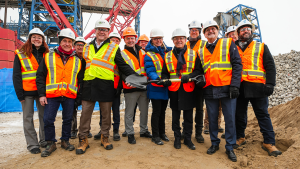Quebec Finance Minister Eric Girard has announced a significant boost to infrastructure spending intended to spur economic recovery.
Girard announced in his budget speech March 25 that spending under the 2021-2031 Quebec Infrastructure Plan (QIP) will total $135 billion, an increase of $4.5 billion compared to the previous QIP.
And the plan will be accelerated, with nearly 60 per cent of its investments to be made by 2025-2026. Nearly $13.4 billion more will be spent in the first five years of the QIP compared with the previous QIP, bringing spending in the next five years to a total of $77 billion.
“With a more ambitious QIP than ever before, the government is laying the groundwork for robust long-term growth and ensuring that Quebecers have modern infrastructure in the future,” Girard stated.
He also announced the government’s intention to extend high-speed internet to all citizens within two years. The government will spend $1.255 billion to achieve that goal by the end of 2022.
“With significant will, determination and means, the government has freed up the necessary resources to ensure that high-speed internet is accessible throughout Quebec by the end of 2022. This would be a first in Canada,” said Girard.
For 2020, Quebec’s economy performed slightly better than the Canadian economy, with production declining 5.2 per cent in Quebec compared to 5.4 per cent across Canada.
The deficit will reach $15 billion in 2020-2021 and $12.3 billion in 2021-2022. Girard announced the government plans to return to a balanced budget by 2027-2028.
The plan to accelerate infrastructure spending means an advanced construction schedule for nearly 90 primary and secondary schools, more than 700 school upgrade projects, the development of 46 seniors homes and the construction and redevelopment of more than 20 residential and long-term–care centres.
An additional $2.6 billion will be spent on the road network and $1.5 billion will be allocated to improve mobility and electrify public transit.
As well, a total of $100 million will be spent on heritage buildings and cultural infrastructure.
Four days earlier, Quebec’s President of the Treasury Board Sonia LeBel and Minister of Labour, Employment and Social Solidarity Jean Boulet announced the government would spend $120 million over the next three years on training and other measures to boost the capacity of the construction sector to participate in the infrastructure stimulus plan.
“Because of the pandemic we need to make sure we have strong measures to jump–start the economy,” LeBel said at the March 21 news conference.
“That being said, if we do have a massive injection of money in that sector, we have to make sure that sector is able to respond.”
Construction labour market supports include $32.4 million in spending over three years.
New measures will support companies bidding on public contracts, induce bundling of projects by small municipalities and encourage construction companies to modernize their business operations.
The Corporation of Master Electricians of Quebec (CMEQ) was among a group of construction stakeholders praising the March 21 announcement.
“This announcement is the result of…work in which CMEQ has participated over the last three years. CMEQ intervened with the government and the Commission de la construction du Quebec to ensure that the Quebec Infrastructure Plan supports the construction industry and measures to counter the scarcity of the workforce be adopted,” said CMEQ director general Simon Bussiere in a statement.
Follow the author on Twitter @DonWall_DCN.











Recent Comments
comments for this post are closed